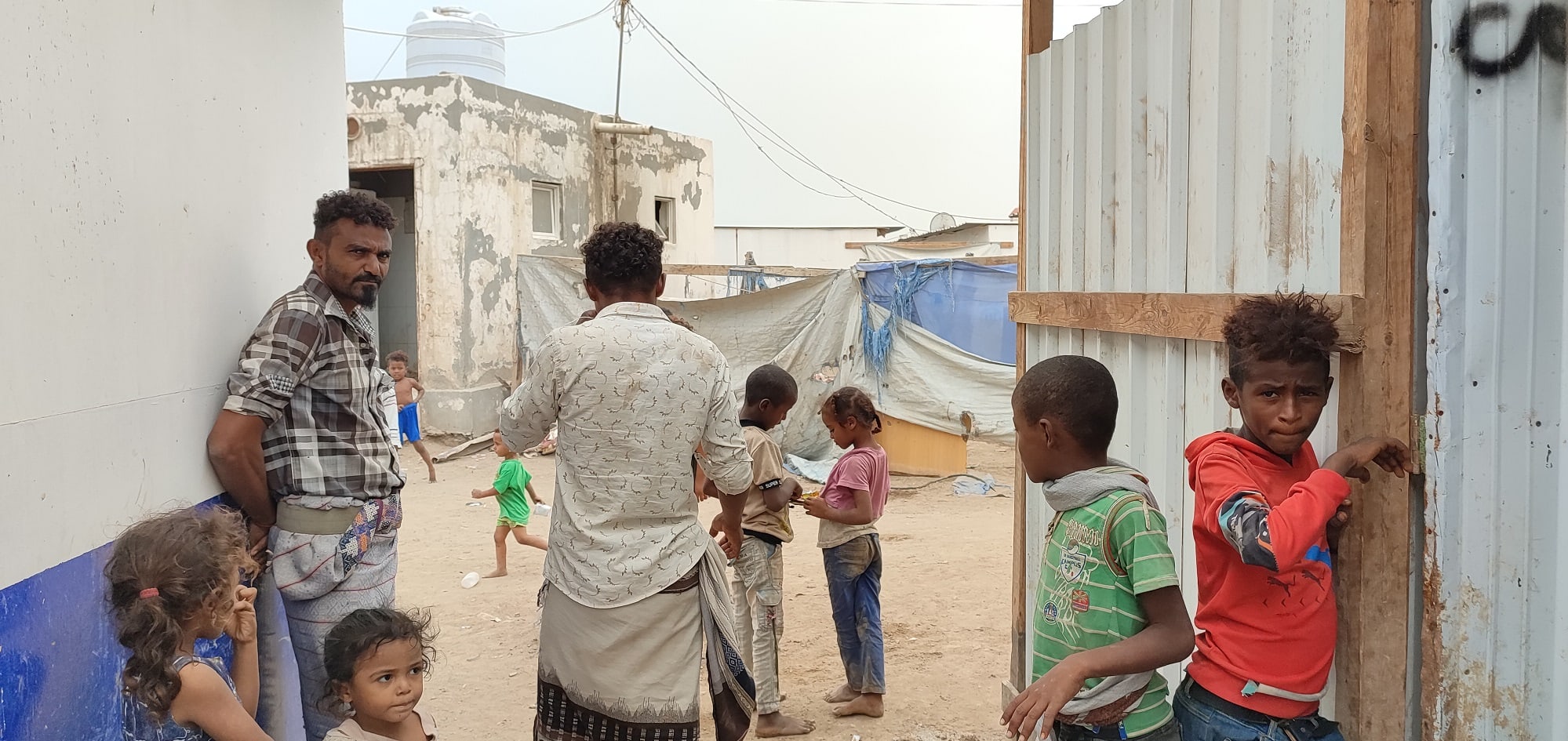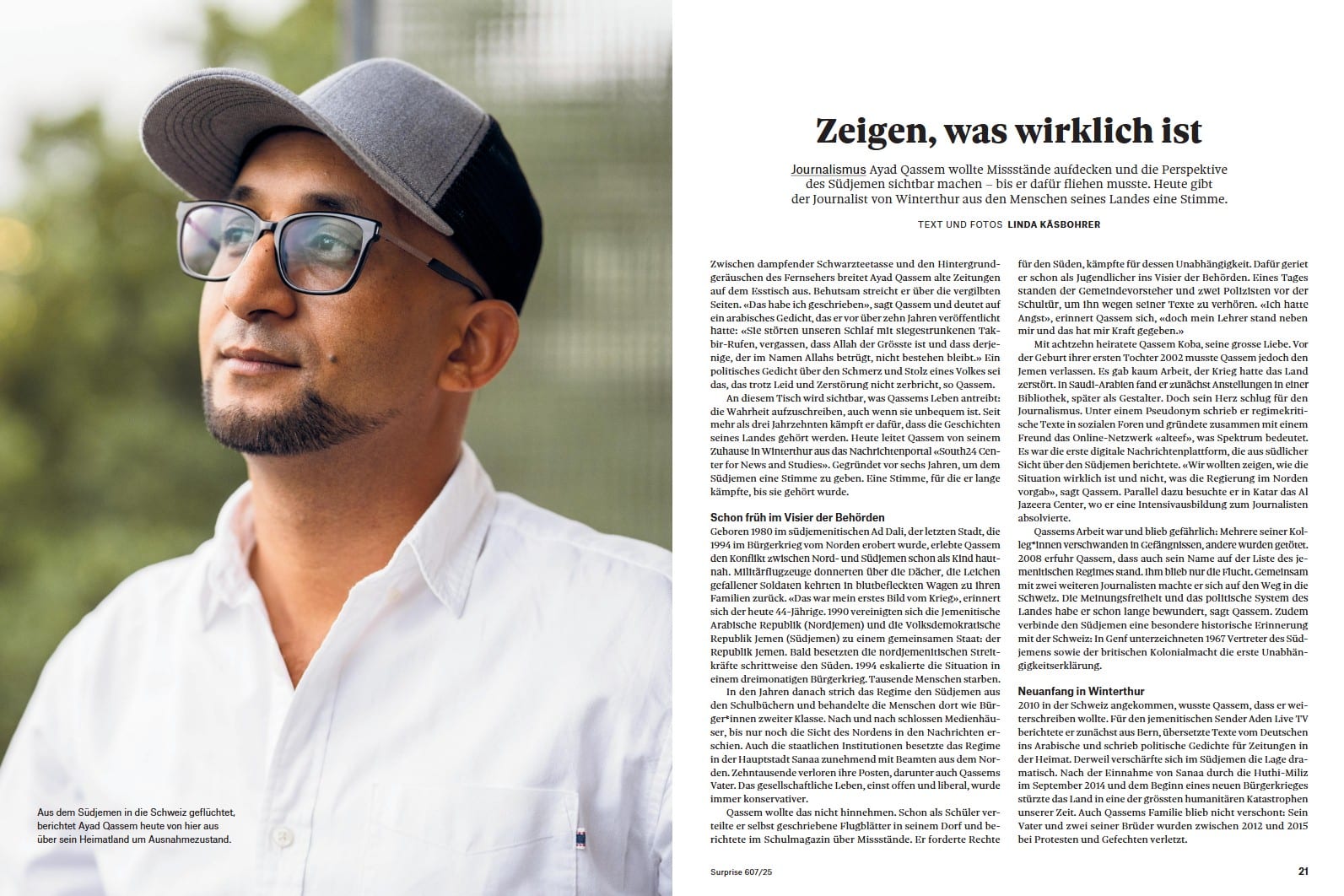
Displaced people in the city of Aden, August 2022 (South24 Center)
آخر تحديث في: 03-08-2023 الساعة 12 مساءً بتوقيت عدن
The economic file has long constituted a political pressure tool which can be exploited by some regional and local parties to settle scores on the Yemeni crisis.
Farida Ahmed (South24)
South Yemen's governorates and the areas under the control of the Yemeni Internationally recognized government in North are witnessing a widespread economic collapse. This has directly affected the service and livelihood conditions in these areas, especially in the capital, Aden, the current headquarters of the government. The currency collapse reached low records as the value of one dollar touched the level of 1494 riyals according to the Central Bank of Yemen itself.
Along with the deterioration of the economic situation, the bombing of oil facilities and ports in Hadramout and Shabwa governorates in South Yemen during October and November 2022 deprived the government from a main source of revenue from exporting oil. This has negatively ceased oil exports which resulted in dangerous economic repercussions as well as a severe and unprecedented financial crisis. It is worth mentioning that oil exports represented 70% of the government's revenues before the war. During the war, they have been a main source of the government's revenues. This has dramatically led to the collapse of the local currency during the months that followed the attack on the ports, especially amid the delay of governmental efforts to deliver the aid announced by Saudi Arabia and the UAE to the Central Bank after the establishment of the Presidential Leadership Council (PLC) in April 2022.
Indeed, the oil file is overly complicated. This issue is not related to the current conflict but to the oil sector infrastructure in Yemen in general, especially since it was discovered four decades ago. Although Yemen owns confirmed oil reserves of about 3 billion barrels and 17 trillion cubic meters of natural gas according to the US Energy Information Administration. Hadramout, the biggest governorate, has 80% of oil reserves. However, a big part of oil revenues kept going to the pockets of influences by using legal and illegal ways. This increased after 2015. However, one cannot address this matter in such superficiality. Undoubtedly, the corruption of the conservative Yemeni governments has contributed to the deterioration of the oil sector since it was discovered. However, local tribal sources kept accusing neighboring states of hindering many deals with foreign companies which could have opened big horizons for Yemen on this side.
As for the service and livelihood conditions, the situation has largely deteriorated over the last few years. Local sources told "South24 Center" that "despite the relatively stable security situation in Aden, the service and livelihood conditions have worsened since the UAE officially withdrew in 2019. This is because Abu Dhabi was extremely interested in funding the food sector as well as many projects in electricity, water, and healthcare in addition to the regular payment of civil and military salaries along with a relative stability of local currency.
The ongoing failure of "Maeen Abdulmalik's" government in treating the service files and the Southern Transitional Council (STC) decline to share the burden of this fiasco have provoked the local street. On July 19, Aden witnessed a protest that denounced the collapse of the electricity service and the failure of the legitimate government to address this file. Days earlier, this was preceded by popular anger when citizens burnt vehicle tires in some streets in Aden due to the increase of power outages amid very hot weather. Indeed, such protests have repeatedly occurred over the years without any drastic and serious treatments in this file by all parties. The Internationally Recognized Government of Yemen (IRGY) kept treating the electricity problem temporarily in a way that led to the re-emergence of the problem again. This gradually has killed the people's trust in the government's pledges for making real treatments.
Exchanging accusations
In June, the Governor of Aden, Ahmed bin Lamlas, gave instructions to prevent the transfer of Aden's revenues to the Central Bank of Yemen. This came after the deterioration of services in Aden, especially in the electricity file. He blamed the government for the poor services. In return, Maeen Abdulmalik's government said: "The matter should not be limited to blaming the government in order to evade the duties that everyone has to perform, especially with the full awareness of the conditions experienced by the state public finance". Until now, IRGY parties have exchanged intra-accusations. The growing economic deterioration can impact salaries and public wages in the areas under the IRGY's control over the coming months in case of not finding real treatments, especially amid the decline of foreign reserves and the cessation of oil exports.
It is important to say that the political decisions and facilities provided by the IRGY with Saudi pressure to support the efforts of peace with the Houthis, including the opening of Sanaa International Airport and the operation of the Hodeidah Port on the Red Sea coast, have contributed significantly to the exploitation of these concessions by launching a war on the national economy. For example, the Houthis have prevented passing of goods and tankers in ports between the areas under their control and those under the IRGY's. This aims at halting imports from the Port of Aden and replacing it with Hodeida Port which is controlled by them. This is in addition to the attacks by the militia on the Southern ports to stop oil exports as well as to harm state revenues and the public budget in addition to preventing the IRGY from fulfilling its commitments, including paying salaries to the employees according to the government.
Political punishment
The economic file has long constituted a political pressure tool which can be exploited by some regional and local parties to settle scores on the Yemeni crisis. Many Southerners believe that there is a clear deliberation to plunge Aden, the headquarters of the IRGY and the STC, into a torrent of endless crises and to exploit file politically for many reasons, including the transfer of the capital to a more stable place in terms of service and livelihood where other local parties have influence. Moreover, there is a dominant belief by some influential Northern forces that with the improvement of the service and livelihood conditions in Aden and other areas in South Yemen, the latter will be closer to achieve the independence project.
Observers believe that the ongoing economic, service, and livelihood deterioration is a governmental attempt, with Saudi instructions, to tame the STC and dismantle the social incubators around its political project. Riyadh, in particular, has recently adopted a stance that collides with the STC's project. It is based on the establishment of demographic entities in South Yemen governorates. Its implementation is sponsored by PLC President Rashad Al-Alimi. These entities include the Hadramout National Council which was met by a large popular objection in Hadramout before others. However, the STC cannot be absolved of the responsibility for the deterioration of economic, livelihood, and service conditions in Aden and the areas under the IRGY's control where it has an equal political and management power share. The STC is the strongest and most influential party in the Southern equation, in terms of its ministerial bloc in the government and its influence on the PLC. It is clear that it has failed to change many files, foremost of which is services. Such a failure was discussed in a report published by "South Center" which pointed out the fiasco and the weak role of the STC.
Treatments and solutions
The service file, especially electricity, constitutes a main fulcrum of the economy. Its weak services obstructed many major reforms in other sectors such as water, health care, education, and others. Therefore, it is important to find serious solutions and treatments for this file.
The STC can present comprehensive strategic studies to the government that drastically solve the electrical system crisis in Aden, and to determine the necessary costs of the project to be approved by stakeholders. If the government spends approximately 60 million dollars over one month only in order to temporarily solve the electricity crisis, the STC can push in this direction and pressure the government to finance the implementation of the solution project to drastically alleviate the daily suffering of people. If the government does not respond to these proposals, it will bear the responsibility alone in front of the people. Both the government and the STC attempt to evade responsibility toward the file service by blaming each other.
The STC is still obsessed by the idea that the file service, especially electricity, is used for political blackmail against it. This pushed it to deliver concessions to avoid political pressure. In return, this makes it quickly denies its responsibility for the deterioration of services and to blame the government alone. Furthermore, STC tries to exploit the popular anger due to the service collapse to gather support around it against the government. However, the mutual blaming game between the two parties has increased the deterioration of livelihood and service conditions. Thus, the STC would actually absolve itself from responsibility if it prepares studies that propose drastic not temporary solutions for the electricity crisis at least and presents it to the government. The STC will then put full responsibility on the government's shoulders to implement them. This would increase the STC’s popularity and end any political blackmail attempts against it ultimately.
The governmental parties should exert more needed efforts in this file seriously and refrain from exploiting or employing it politically. The remaining status quo of the services and livelihood file will be followed by ongoing failure which may gradually lead to popular anger that will explode in the face of everyone without exception.
9 years of the Yemen war have revealed that Aden, which was a starting point to liberate the South governorates and some Northern areas from the Houthi grip, has been largely let down by the Saudi-led Coalition in Yemen. This has strengthened the Houthi stance at the popular level in the Northern areas. This painful truth alone needs a regional review.
South24 Center for News and Studies Executive Director
*Note: The Arabic version of this analysis was published on 29/07/2023

قبل 3 أشهر

قبل 3 أشهر